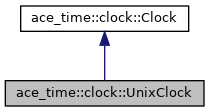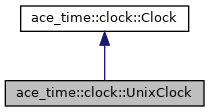An implementation of Clock that works on Unix using EpoxyDuino. More...
#include <UnixClock.h>


Public Member Functions | |
| void | setup () |
| Setup function that currently does nothing. | |
| acetime_t | getNow () const override |
| Return the number of seconds since the AceTime epoch (2000-01-01T00:00:00Z). More... | |
 Public Member Functions inherited from ace_time::clock::Clock Public Member Functions inherited from ace_time::clock::Clock | |
| Clock ()=default | |
| Default constructor. | |
| ~Clock ()=default | |
| We deliberately avoid using a virtual destructor. More... | |
| virtual void | sendRequest () const |
| Send a time request asynchronously. | |
| virtual bool | isResponseReady () const |
| Return true if a response is ready. | |
| virtual acetime_t | readResponse () const |
| Returns number of seconds since AceTime epoch (2000-01-01). More... | |
| virtual void | setNow (acetime_t) |
| Set the time to the indicated seconds. More... | |
Additional Inherited Members | |
 Static Public Attributes inherited from ace_time::clock::Clock Static Public Attributes inherited from ace_time::clock::Clock | |
| static const acetime_t | kInvalidSeconds = LocalTime::kInvalidSeconds |
| Error value returned by getNow() and other methods when this object is not yet initialized. | |
Detailed Description
An implementation of Clock that works on Unix using EpoxyDuino.
Definition at line 21 of file UnixClock.h.
Member Function Documentation
◆ getNow()
|
inlineoverridevirtual |
Return the number of seconds since the AceTime epoch (2000-01-01T00:00:00Z).
Returns kInvalidSeconds if an error has occured.
This is a blocking call. Some clocks (e.g. NTP client) this may take many seconds. On those clocks, use the asynchronous methods (sendRequest(), isResponseReady(), and readResponse()) instead.
Since acetime_t is a 32-bit integer, this method is valid if the current Unix time() is within about +/- 68 years of the current epoch being used by the AceTime library, as defined by Epoch::currentEpochYear().
Implements ace_time::clock::Clock.
Definition at line 36 of file UnixClock.h.
The documentation for this class was generated from the following file:
- /home/brian/src/AceTimeClock/src/ace_time/clock/UnixClock.h